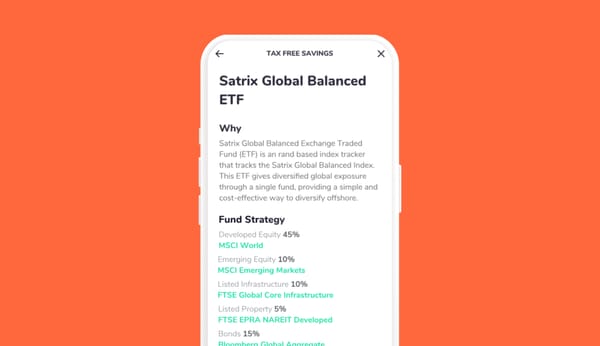Money is an unavoidable part of life. But if you master your finances, you can make it work for you to reach your goals. And that requires a solid financial plan.
So what does a financial plan actually look like?
A comprehensive financial plan usually covers:
- An outline of your life goals (property, holidays, starting a family)
- Being prepared for anything (emergency fund, medical aid and insurance)
- Saving for a retirement worth waiting for
- Passing on a legacy through a will and tax-savvy estate planning
If you don’t have half the things on that list covered, don’t stress – most people don’t. But as you embark on this journey of owning your finances and working towards financial freedom, it’s a good idea to start ticking them off.
Most people go this alone, using a combination of research and technology, like robo-advisors (more on that later), to pull it together. Others might want, or need, some extra help from the experts. This is where a financial adviser comes into the picture.
What is a financial adviser?
If you weren’t feeling well, or wanted to go for a proactive health check-up, you’d consult a qualified doctor, right? With years of training and practical experience, they’re the experts you trust with important health matters.
Similarly, with years of training in these areas, a financial adviser knows the ins and outs of financial concepts, terms and products, and the exact scenarios they’re suited to.
“The financial services sector is one that comes with a lot of seemingly complicated concepts and jargon. Unless [they’re] in the industry, most people have no real incentive or interest to unearth what these things actually mean,” says the team at Lifecheq, a digitised financial adviser programme that connects you to an expert financial adviser to look at your holistic financial and life situation and help you plan for the future.
Trained financial advisers should help you achieve your financial goals by harnessing this expertise to design strategies or plans and recommend products that create wealth, reduce costs and eliminate debt.
When and where it's a good idea to get a financial adviser
It’s always a good idea to get some sound advice from a qualified expert (if they’re good at what they do and have your best interests at heart – more on that later), but here’s a general guide for when you should see a financial adviser:
How do I choose the right financial adviser?
Before we dive into this topic, it’s a good idea that we mention that not all financial advisers are created equal. Like any professional in their industry, there are good financial advisers, and, well, bad ones. Let’s look at the different types of financial advisers to better understand:
Types of financial advisers
Tied adviser
- This is a financial planning professional that is ‘tied’ to a specific financial institution, and is tasked to only sell products offered by that institution.
- They usually earn a commission on life policies and investments that you sign up to through them. That means they’re incentivised to encourage you to sign up.
Independent adviser
- These aren’t bound to certain institutions and their products.
- They typically charge an advisory fee for an initial plan, as well as an ongoing fee on your investments.
What you should expect from a financial adviser
A good adviser should be your financial planning partner who is able to make recommendations that suit your lifestyle needs and budget. Whether you’ve just started working and need to protect your ability to earn and begin saving towards retirement, or need extra life cover and savings for your children’s education.
“A financial adviser is intended to be your source of financial knowledge and guidance who sees you as a whole person with important needs and goals,” says the team at Lifecheq.
They should get a good understanding of your financial health, and together, you will cover many topics, including:
- The amount of money you should invest,
- The types of investment products that would be best for you,
- The kinds of insurance you should have, and
- Retirement and tax planning.
“As your accountability partner, your adviser is also there to help you adjust and right the ship should one of life’s unexpected curveballs derail your plans,” says the team at Lifecheq.
Lifecheq connects you to an expert financial adviser that has gone through thorough checks and tests to look at your holistic financial and life situation, and works with you to generate a personalised Lifecheq Plan that you can access at any time to track progress towards your goals.
What’s the alternatives to financial advisers?
As technology continues to progress, there are an increasing number of ‘robo-advisers’ in the market.
These are automated tools using advanced algorithms that can recommend a personalised investment portfolio tailored to your needs. For example, the Franc robo-advisor asks you questions that help it to determine the right investment strategy based on each of your goals.
Robo-advisers automate the process of collecting and interpreting information, meaning that they can complete the data analysis portion of a financial adviser’s job in a fraction of the time, and at a fraction of the cost.
If you’re on a tight budget, or your life situation is relatively simple and you have the basics down, a robo-advisor can help set you up for success. It can also go hand-in-hand with a financial adviser to help you work out specific contributions to reach your goals, for example.
The bottom line
Financial advisers are professionals who should partner with you to work out a financial strategy to achieve your goals and give you financial peace-of-mind in the case of an emergency. It’s a good idea to consult one to set up your financial plan and make sure you have all your bases covered.
Like any professional, though, there are good advisers and not-so-good advisers, so it’s worth doing your research to make sure yours is independent, well-qualified, and looking out for your best interests, not their own.







![How & Why You Should Do a Financial Reset [+ downloadable financial reset journal]](/blog/content/images/size/w600/2024/12/Setting-goals-for-the-year.png)


